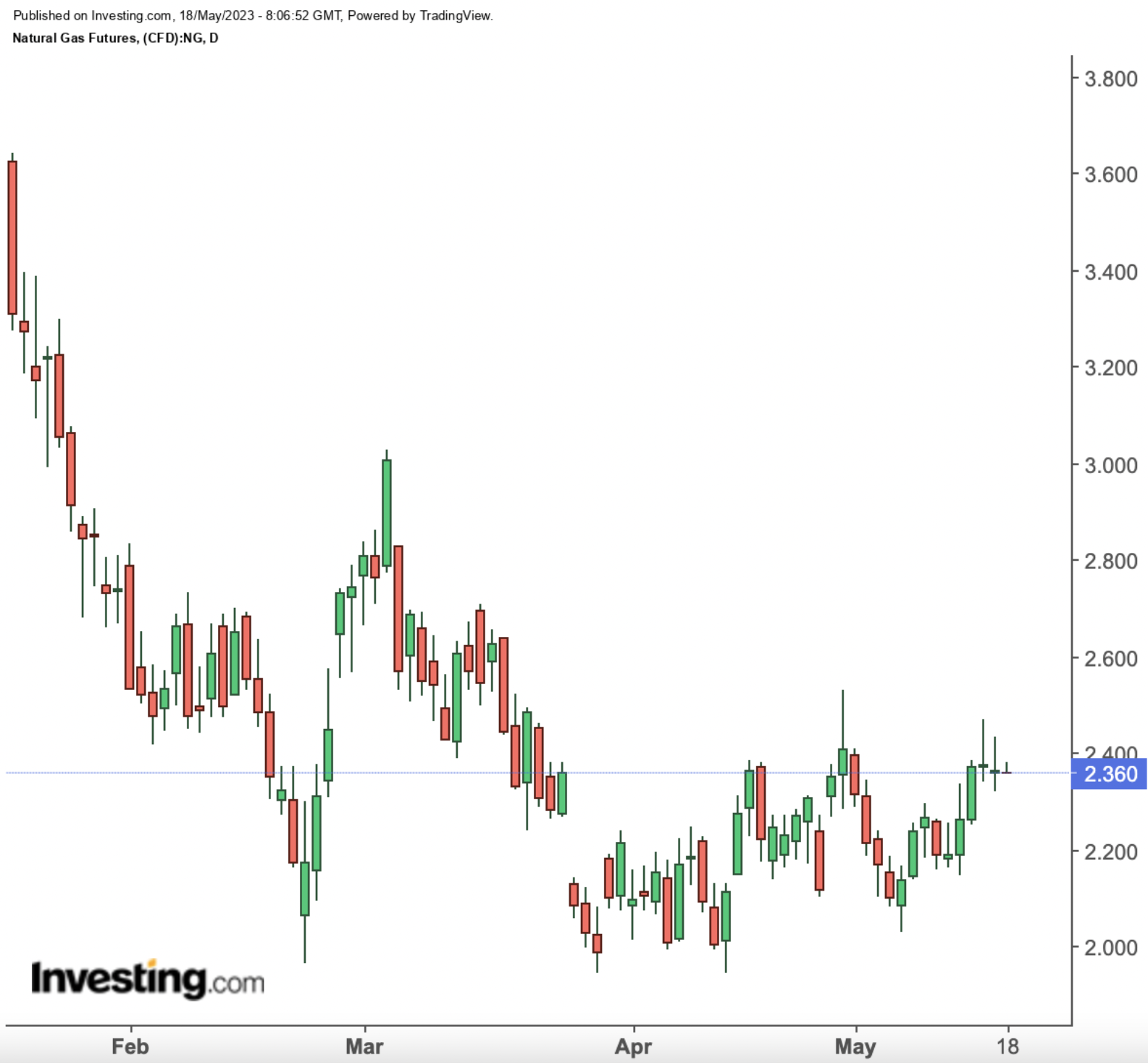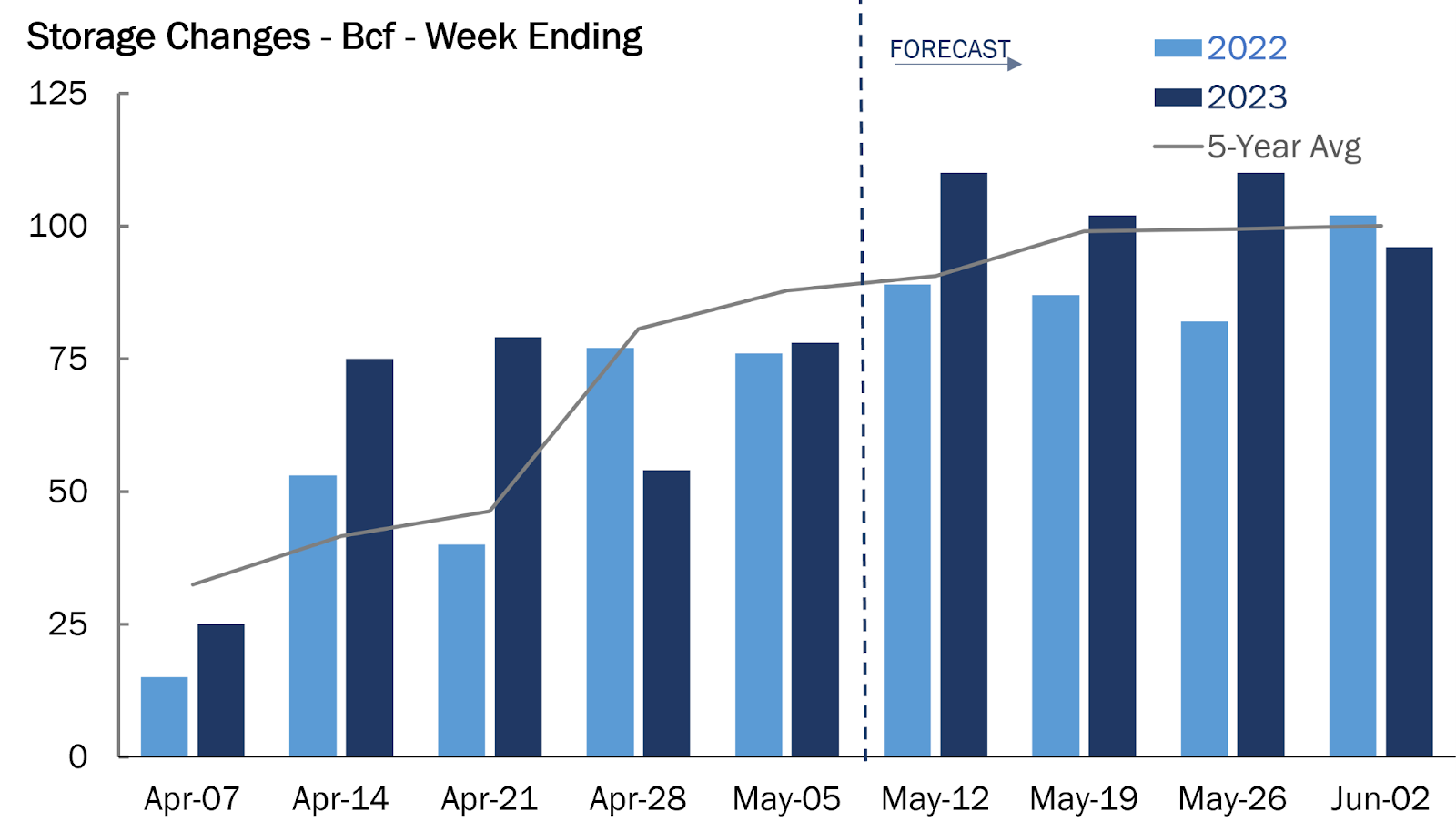- 100-bcf storage builds are likely here; last week’s rise could last 2 more weeks
- Gas bulls say trade is deceived by current output/ demand that could change
- Technical charts show next target for bulls would be $2.64
Three-digit injections are probably here but natural gas prices are also ramping up for a second straight week. What gives?
Bulls would call it deception. Their argument is that for a shoulder season — or period when demand for gas is off-peak — that’s full of market stress, volatility, background noise and angst, futures are locked in a tight mid-$2 pricing.
Their contention is that the balance in supply and demand is now shifting — despite gas storage being at eye-watering levels above one-year and five-year norms.
Recent dips in wind generation across the Continental United States have been supportive to prices while extensive maintenance across production sites has lifted feed demand for liquefied natural gas, or LNG.
On the supply side, gas rig counts have fallen from 161 at end-April to 141 now, underscoring output cuts by natural gas producers stressed by market plunges that began at $10 in August and reached under $2 earlier this year.
Oil rigs, which produce associated gas, have, meanwhile, dropped from 607 on Feb. 12 to 586 on May 7. The Drilling Productivity Report of the Energy Information Administration, or EIA — due on Monday — could project more decreases in gas production growth.
While production continues to average at about 100 billion cubic feet, or bcf, per day, the party for the bears may be ending.
A few weeks of uninterrupted high heat by mid-summer, lower shale production, a low wind period and high LNG demand could send EOS to bullish levels is the contention. EOS, or Equations of State, is a widely-used landmark in oil and gas to predict the phase behavior of petroleum fluids. An EOS of a substance usually refers to an expression that describes the relationship between pressure, temperature, and volume.
Eli Rubin of EBW Analytics says:
“Higher well declines are responsible for roughly halving the production growth rate in dry gas supply.”
On another supply point, as Canadian wildfires subside, the suppliers up in North America are expected to be more keen on catching up on domestic storage injections than regularizing exports to the United States, which might need it most at the height of summer.
Well, that’s the bull narrative for gas which tells us that we’re being deceived by the “lull” before the storm of the summer heat, reduced production, low-wind and higher LNG demand combo which could invariably lead to higher prices.
The flip side is, of course, that for most of these, the offsets are as significant.
For now, any real production declines are nowhere.
For gas surpluses to drop under the five-year average, or 300 bcf, production will need to decline to under 99 bcf/day, while working in concert with widespread heat, Rhett Milne of NatGasWeather.com says. 
Source: Gelber & Associates
With gas inventories from two weeks ago already 31% above year-ago levels and 18% higher than the five-year average, last week’s expected addition of 108 bcf might not help longs in the game wishing to escape the $2 price trap.
Yet, for a second week in a row, the front-month gas futures contract on the New York Mercantile Exchange’s Henry Hub, is rallying, gaining 5% week-to-date after last week’s 6%.
Said Sunil Kumar Dixit, chief technical strategist at SKCharting.com:
“Gas bulls are trying hard to establish a foothold above the 50-day EMA, or Exponential Moving Average, dynamically positioned at $2.388. This will be needed for reclaiming the next upward leg marked by the 100-day SMA, or Simple Moving Average, of $2.64.
Failing to make a sustainable break above the $2.388 level will pause the current upward momentum and the downward shift to the Daily Middle Bollinger Band of $2.26 will come quickly. Below this awaits the drop to $2.13, which is probably necessary before the uptrend can be restored.”
The latest weekly gas build will be verified by the U.S. Energy Information in an update due at 10:00 AM ET (14:00 GMT) today.
It comes after another round of barely supportive weather that could persist long enough to deliver another two rounds of injections in the 100-bcf range.
On the weather front, Mickey Shuman, a senior meteorologist with Atmospheric G2, says an amplified upper-level pattern will continue this week, resulting in a prolonged stretch of above-average warmth in western North America.
Meanwhile, multiple disturbances, cold fronts and associated wet weather will lead to changeable but generally cool weather in the central, southern and eastern U.S. Shuman adds:
“A broad fluctuating upper-level ridge stretching over the northern US and southern Canada will lead to an expansion of above-average warmth. However, undercutting upper-level disturbances and a recent uptick in soil moisture will prevent anomalous warmth from building in the southern tier, keeping temperatures closer to normal.”
Steven Silver, a senior meteorologist at Maxar, has a slightly more upbeat take on the weather, saying that after record heat seen in the Pacific Northwest earlier this week, temperatures are expected to remain unseasonably warm rest of the week.
Above-normal temperatures are seen elsewhere in most of the West while temperatures cool to below-normal behind a cold front this week in the East.
Temperatures remain slightly cooler than normal in Texas where wetter-than-normal conditions persist, while temperatures are generally near normal in the eastern third.
On the global front, the EU is reportedly unlikely to agree to a proposal that suggests banning natural gas imports from Russian pipelines.
Russia continues to supply gas to Europe through transit routes in Ukraine and via TurkStream and the EU was considering a prohibition of gas imports resuming regardless of whether Russia wants to resume exporting gas.
There is reportedly no consensus within the EU to support the idea of banning the resumption of Russian gas flows and countries that are heavily reliant on natural gas are resisting such measures.
Their argument is that introducing such a significant measure at this point would be impractical. Those in favor of the measure argue that reducing the energy supply from Russia is imperative and must be maintained at least until the conflict in Ukraine ends.
***
Disclaimer: The content of this article is purely to educate and inform and does not in any way represent an inducement or recommendation to buy or sell any commodity or its related securities. The author Barani Krishnan does not hold a position in the commodities and securities he writes about. He typically uses a range of views outside his own to bring diversity to his analysis of any market. For neutrality, he sometimes presents contrarian views and market variables.
